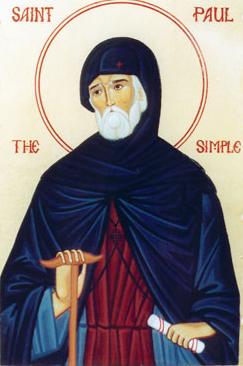
Feastday: March 7Paul spent his first sixty years in the world, employed as a laborer. He then suffered the ordeal of discovering that his wife had committed adultery. Thereafter, Paul withdrew into the Egyptian desert in the hope of becoming a hermit under the tutelage of Saint Anthony the Abbot. Upon seeing this aged would-be disciple at his door, Anthony judged him to be ill suited to eremitical life, and refused to receive him. But Paul refused to leave. Anthony thereupon decided to test Paul's virtue by commanding him to carry out a series of difficult tasks, including a very prolonged regimen of continuous prayer, the sewing of mats that he was then instructed to take apart and sew all over again, and very strict fasting. Paul proved himself to be unwavering in obedience and perseverance, winning Anthony's confidence and admiration. Anthony was later to say of Paul, "How this monk puts us all to shame! He immediately obeys man's simplest order, while we often fail to listen to the word which comes to us from heaven." Paul lived his remaining years in great humility and childlike simplicity.
Death: 339
St. Paul the Simple of Egypt (d. ca. 339) was a hermit and disciple of St. Anthony the Great. St. John, the Abbot of Sinai wrote "Paul the Simple was a clear example for us, for he was the rule and type of blessed simplicity." Though contemporaries, he is not to be confused with St. Paul of Thebes, regarded as the First Hermit. The account of his life is found in Palladius of Helenopolis De Vitis Patrum 8,28 and Tyrannius Rufinus Historia Eremitica 31.
Life
Paul was a farmer who, at the age of sixty, discovered that his beautiful wife was having an affair and so left her to become a hermit. Approaching St. Anthony, Paul indicated his desire to become a monk. Anthony responded by saying it would be quite impossible for a man of sixty years to adopt such a radical life style. He instead encouraged Paul to be content with the life of being a thankful and pious labourer. Paul was unsatisfied with this answer and responded by pleading his will to learn. Anthony said that if he wished to be a monk he should go to a cenobium. With this St. Anthony shut the door, and Paul remained outside. On the fourth day St. Anthony, fearing lest he should die, took him in. He set him to work weaving a rope out of palm leaves, made him undo what he had done, and do it again.
That night at dinner, St. Anthony took a crust of bread and gave three to Paul. When each had eaten one crust, Anthony told Paul to eat another. "If you have another one, I will," said Paul, "but not if you won't." "I've had quite sufficient for one who is a monk," said Anthony. Paul replied, "Then one is enough for me, for I want to be a monk."
St. Anthony continued to test Paul's endurance and humility through hard work, severe fasting, with nightly vigils, constant singing of Psalms and prostrations. Anthony, who was impressed by Paul's dedication, permitted Paul a separate cell some miles from his own.
Eventually, it was said that, Paul the Simple was able to cast out demons. Anthony, it is recorded, had passed a possessed youth saying, "I cannot help the boy, for I have not received power over the Prince of the demons. Paul the Simple, however, does have this gift."





